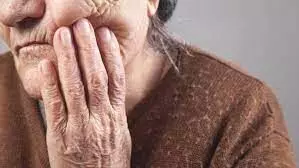- Home
- Medical news & Guidelines
- Anesthesiology
- Cardiology and CTVS
- Critical Care
- Dentistry
- Dermatology
- Diabetes and Endocrinology
- ENT
- Gastroenterology
- Medicine
- Nephrology
- Neurology
- Obstretics-Gynaecology
- Oncology
- Ophthalmology
- Orthopaedics
- Pediatrics-Neonatology
- Psychiatry
- Pulmonology
- Radiology
- Surgery
- Urology
- Laboratory Medicine
- Diet
- Nursing
- Paramedical
- Physiotherapy
- Health news
- AYUSH
- State News
- Andaman and Nicobar Islands
- Andhra Pradesh
- Arunachal Pradesh
- Assam
- Bihar
- Chandigarh
- Chattisgarh
- Dadra and Nagar Haveli
- Daman and Diu
- Delhi
- Goa
- Gujarat
- Haryana
- Himachal Pradesh
- Jammu & Kashmir
- Jharkhand
- Karnataka
- Kerala
- Ladakh
- Lakshadweep
- Madhya Pradesh
- Maharashtra
- Manipur
- Meghalaya
- Mizoram
- Nagaland
- Odisha
- Puducherry
- Punjab
- Rajasthan
- Sikkim
- Tamil Nadu
- Telangana
- Tripura
- Uttar Pradesh
- Uttrakhand
- West Bengal
- Medical Education
- Industry
Edentulism tied with depression among middle-aged and elderly

The higher prevalence of edentulism linked to a higher rate of depression among middle-aged and elderly suggests a new study published in the Journal of Oral Rehabilitation.
Depression is a major health condition among the ageing population. Previous studies indicated that edentulism was a risk factor for depression. The link between edentulism and depression has not been fully clarified. This study aimed to estimate whether chewing difficulties play a mediating role in the association between edentulism and depression among middle-aged and older populations with national cross-sectional data. Data were obtained from the latest fourth wave of the China Health and Retirement Longitudinal Study (CHARLS). The outcome variable was set as depression, which was measured by the Center for Epidemiologic Studies Depression Scale (CES-D-10). Independent and mediated variables were separately set as self-assessed edentulism and chewing difficulties. The nearest neighbour propensity score matching (PSM) method was used to construct a matching group to balance the basic characteristics of individuals with and without edentulism with minimised bias in the estimation. Causal mediation analysis was performed to estimate the degree of contribution of chewing difficulties to the association between edentulism and depression. Several sensitivity analyses were performed to evaluate the robustness of the primary result. Results: A total of 15 853 individuals remained for analysis. After PSM, 809 individuals with edentulism and 2628 without edentulism remained for analysis. Among the matched individuals, the mean age was 66.3 ± 9.2 years, 58.5% were female, 78.8% lived in rural areas, 23.5% had edentulism, 51.1% had depressive symptoms, and 50.1% had chewing difficulties. Logistic regression results showed that a higher incidence of edentulism was associated with a higher rate of depression (OR: 1.39, 95% CI: 1.19–1.63) in the matching group. Causal mediation analysis results indicated that the average mediation effect of chewing difficulties on the association between edentulism and depression was 0.010 (95% CI: 0.005–0.015), and the average direct effect was 0.072 (95% CI: 0.036–0.11). The mediation proportion of chewing difficulties was 11.7% (95% CI: 0.079–0.21). A higher prevalence of edentulism was associated with a higher rate of depression among middle-aged and elderly populations. Chewing difficulties moderately mediated the association between edentulism and depression. Fundamental oral function should not be neglected to improve mental health among the aging population.
Qu X, Wang Q, Zhang J, He W, Zhang F, Zhang W. Chewing difficulties mediated association between edentulism and depressive symptoms among middle aged and older population. J Oral Rehabil. 2023; 00: 1-10. doi:10.1111/joor.13623
Qu X, Wang Q, Zhang J, He W, Zhang F, Zhang W, Chewing, difficulties, mediated, association, between, edentulism, and, depressive, symptoms, among, middle, aged, older population, Journal of Oral rehabilitation
Dr. Shravani Dali has completed her BDS from Pravara institute of medical sciences, loni. Following which she extensively worked in the healthcare sector for 2+ years. She has been actively involved in writing blogs in field of health and wellness. Currently she is pursuing her Masters of public health-health administration from Tata institute of social sciences. She can be contacted at editorial@medicaldialogues.in.



